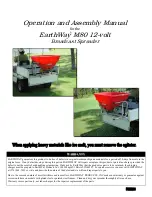
January 1, 2002
16
Lit. No. 13648/9511
RECEIVER HITCH
Sway Controls
Sway controls can lessen the effects of sudden
maneuvers, wind gusts, and buffeting caused by other
vehicles. We recommend sway controls for trailers
with large surface areas, such as travel trailers.
Adjustable friction models can help control the sway of
travel trailers with low tongue weight percentages.
Other Useful Equipment
Air springs, air shocks, or helper springs are useful for
some hitch applications. A transmission cooler may be
necessary for heavy towing. Many states require
towing mirrors on both sides.
Tire Inflation
Check often. Follow tow vehicle and trailer
manufacturer’s recommendations. Improper tire
inflation can cause trailer sway.
Equipment and Parts Check
Check ball, coupler, chains, retaining pins and clips
and all other connections every time you tow. Re-
check at fuel and rest stops.
No Passengers in Trailers!
Under no circumstances should people be allowed in
trailers while towing.
Trailer Loading
Proper loading helps prevent sway. Place heavy
objects on the floor ahead of the axle. Balance the
load side to side and secure it to prevent shifting.
Tongue weight should be 10-15 percent of gross
weight for most trailers. Too low a percentage of
tongue weight can cause sway. Never load the trailer
rear-heavy; load the trailer front heavy.
Driving
The additional weight of a trailer affects acceleration,
braking and handling. Allow extra time for passing,
stopping, and changing lanes. Severe bumps can
damage your towing vehicle, hitch, and trailer. Drive
slowly on rough roads. Stop and make a thorough
inspection if any part of your towing system strikes the
road. Correct any problems before resuming travel.
Excessive Sway
Excessive sway can lead to loss of control. Sway
motion should settle out quickly. Sway tends to
increase on a downgrade. Starting slowly, increase the
speed in gradual steps. If sway occurs, reduce speed
slowly, stop, and adjust your trailer load and
equipment. Repeat until the trailer is stable at highway
speed. Do this whenever your trailer loading changes.
Controlling Trailer Sway
Turbulence from another vehicle, a wind gust, or a
downgrade can cause sudden sway along with shift of
the trailer’s load or a trailer tire blowout. If the trailer
sways, it is the driver’s responsibility to assess the
situation and take appropriate action. Below are the
suggestions that may apply when assessing the
situation. If your trailer starts to sway:
•
reduce your speed gradually
•
hold steering wheel as steady as possible
•
and if your trailer has electric brakes, apply the
trailer brakes alone without using the tow vehicles
brakes.
•
do not hit your brake pedal hard unless absolutely
necessary.
•
do not try to steer out of the sway condition.
Sudden or violent steering can worsen the sway.
•
do not speed up or swaying will increase.
•
do not continue towing a trailer that tends to sway
or you may lose control.
Summary of Contents for PRO-FLO
Page 2: ......
Page 4: ......
Page 25: ...Lit No 13648 9511 21 January 1 2002 ...
Page 26: ...January 1 2002 22 Lit No 13648 9511 ...









































